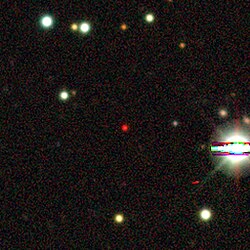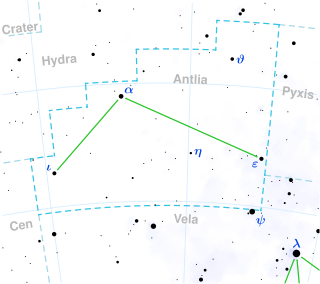2MASS J09393548−2448279
| Observation data Epoch J2000 Equinox J2000 | |
|---|---|
| Constellation | Antlia |
| Right ascension | 09h 39m 35.48s |
| Declination | −24° 48′ 27.9″ |
| Characteristics | |
| Spectral type | T8[1] |
| Apparent magnitude (J) | 15.61 ± 0.09[1] |
| Apparent magnitude (H) | 15.96 ± 0.09[1] |
| Apparent magnitude (K) | 16.83 ± 0.09[1] |
| Astrometry | |
| Proper motion (μ) | RA: +573.4 ± 2.3[2] mas/yr Dec.: −1044.7 ± 2.5[2] mas/yr |
| Parallax (π) | 187.3 ± 4.6 mas[2] |
| Distance | 17.4 ± 0.4 ly (5.3 ± 0.1 pc) |
| Details | |
| 2MASS 0939-2448 A | |
| Mass | 20–50[1] MJup |
| Radius | 1.22+0.1 −0.09[3] RJup |
| Luminosity | 0.000002[4][3] L☉ |
| Surface gravity (log g) | 4.88+0.2 −0.4[3] cgs |
| Temperature | 611+17 −24[3] K |
| Metallicity | −0.3–0.0[1] |
| Age | 2–10[1] Gyr |
| 2MASS 0939-2448 B | |
| Mass | 20–40[1] MJup |
| Radius | 0.09[1] R☉ |
| Temperature | 600–700[1] K |
| Metallicity | −0.3–0.0[1] |
| Age | 2–10[1] Gyr |
| Other designations | |
| Database references | |
| SIMBAD | data |
Location of 2MASS 0939−2448 in the constellation Antlia | |
2MASS J09393548−2448279 (abbreviated 2MASS 0939−2448)[5] is a probable system of two nearby T-type brown dwarfs, located in constellation Antlia at 17.4 light-years from Earth.[2]
Discovery
[edit]2MASS 0939−2448 was identified as a brown dwarf through analysis of data from the 2MASS survey by Tinney et al. The discovery was published in 2005.[5]
Properties
[edit]Model calculations suggest that 2MASS 0939−2448 is a system of two brown dwarfs with effective temperatures of about 500 and 700 K and masses of about 25 and 40 Jupiter masses; it is also possible that it is a pair of identical objects with temperatures of 600 K and 30 Jupiter masses.[1]
Dimmest known brown dwarf
[edit]From publication of the discovery in 2005 till at least 2008, 2MASS 0939−2448, or its dimmer component, was the dimmest brown dwarf known.[6] Later dimmer objects, including (sub)brown dwarfs and rogue planets of new spectral class Y, were discovered, using data from WISE and from other surveys. In 2011–2014, the dimmest known of these objects was WISE 1828+2650, and from 2014 the dimmest one is WISE 0855−0714.
References
[edit]- ^ a b c d e f g h i j k l m Leggett, Sandy K.; Cushing, Michael C.; Saumon, Didier; Marley, Mark S.; Roellig, Thomas L.; Warren, Stephen J.; Burningham, Ben; Jones, Hugh R. A.; Kirkpatrick, J. Davy; Lodieu, Nicolas; Lucas, Philip W.; Mainzer, Amy K.; Martín, Eduardo L.; McCaughrean, Mark J.; Pinfield, David J.; Sloan, Gregory C.; Smart, Richard L.; Tamura, Motohide; Van Cleve, Jeffrey E. (2009). "The Physical Properties of Four ~600 K T Dwarfs". The Astrophysical Journal. 695 (2): 1517–1526. arXiv:0901.4093. Bibcode:2009ApJ...695.1517L. doi:10.1088/0004-637X/695/2/1517. S2CID 44050900.
- ^ a b c d Burgasser, Adam J.; Tinney, C. G.; Cushing, Michael C.; Saumon, Didier; Marley, Mark S.; Bennett, Clara S.; Kirkpatrick, J. Davy (2008). "2MASS J09393548-2448279: The Coldest and Least Luminous Brown Dwarf Binary Known?" (PDF). The Astrophysical Journal. 689 (1): L53 – L56. Bibcode:2008ApJ...689L..53B. doi:10.1086/595747.
- ^ a b c d Line, Michael R.; Marley, Mark S.; Liu, Michael C.; Burningham, Ben; Morley, Caroline V.; Hinkel, Natalie R.; Teske, Johanna; Fortney, Jonathan J.; Freedman, Richard; Lupu, Roxana (2016), "Uniform Atmospheric Retrieval Analysis of Ultracool Dwarfs. II. Properties of 11 T dwarfs", The Astrophysical Journal, 848 (2): 83, arXiv:1612.02809, doi:10.3847/1538-4357/aa7ff0, S2CID 53053922
- ^ Filippazzo, Joseph C.; Rice, Emily L.; Faherty, Jacqueline; Cruz, Kelle L.; Van Gordon, Mollie M.; Looper, Dagny L. (2015), "Fundamental Parameters and Spectral Energy Distributions of Young and Field Age Objects with Masses Spanning the Stellar to Planetary Regime", The Astrophysical Journal, 810 (2): 158, arXiv:1508.01767, Bibcode:2015ApJ...810..158F, doi:10.1088/0004-637X/810/2/158, S2CID 89611607
- ^ a b c Tinney, C. G.; Burgasser, Adam J.; Kirkpatrick, J. Davy; McElwain, Michael W. (2005). "The 2MASS Wide-Field T Dwarf Search. IV. Hunting Out T Dwarfs with Methane Imaging". The Astronomical Journal. 130 (5): 2326–2346. arXiv:astro-ph/0508150. Bibcode:2005AJ....130.2326T. doi:10.1086/491734. S2CID 119451860.
- ^ "Astronomers Find the Two Dimmest Stellar Bulbs" (Press release). NASA/JPL. 2008-12-10. Archived from the original on 2021-10-06. Retrieved 2008-12-20.
- Faherty, Jacqueline K.; Burgasser, Adam J.; Walter, Frederick M.; Van der Bliek, Nicole; Shara, Michael M.; Cruz, Kelle L.; West, Andrew A.; Vrba, Frederick J.; Anglada-Escud, Guillem (2012). "The Brown Dwarf Kinematics Project (BDKP). III. Parallaxes for 70 Ultracool Dwarfs". The Astrophysical Journal. 752 (1): 56. arXiv:1203.5543. Bibcode:2012ApJ...752...56F. doi:10.1088/0004-637X/752/1/56. S2CID 18160586.
- Smart, R. L.; Tinney, C. G.; Bucciarelli, B.; Marocco, F.; Abbas, U.; Andrei, A.; Bernardi, G.; Burningham, B.; Cardoso, C.; Costa, E.; Crosta, M. T.; Daprá, M.; Day-Jones, A.; Goldman, B.; Jones, H. R. A.; Lattanzi, M. G.; Leggett, S. K.; Lucas, P.; Mendez, R.; Penna, J. L.; Pinfield, D.; Smith, L.; Sozzetti, A.; Vecchiato, A. (2013). "NPARSEC: NTT Parallaxes of Southern Extremely Cool objects. Goals, targets, procedures and first results". Monthly Notices of the Royal Astronomical Society. 433 (3): 2054–2063. arXiv:1306.4527. Bibcode:2013MNRAS.433.2054S. doi:10.1093/mnras/stt876. S2CID 1376087.


